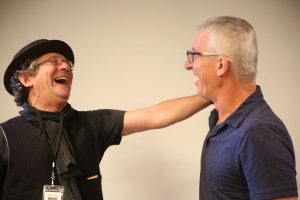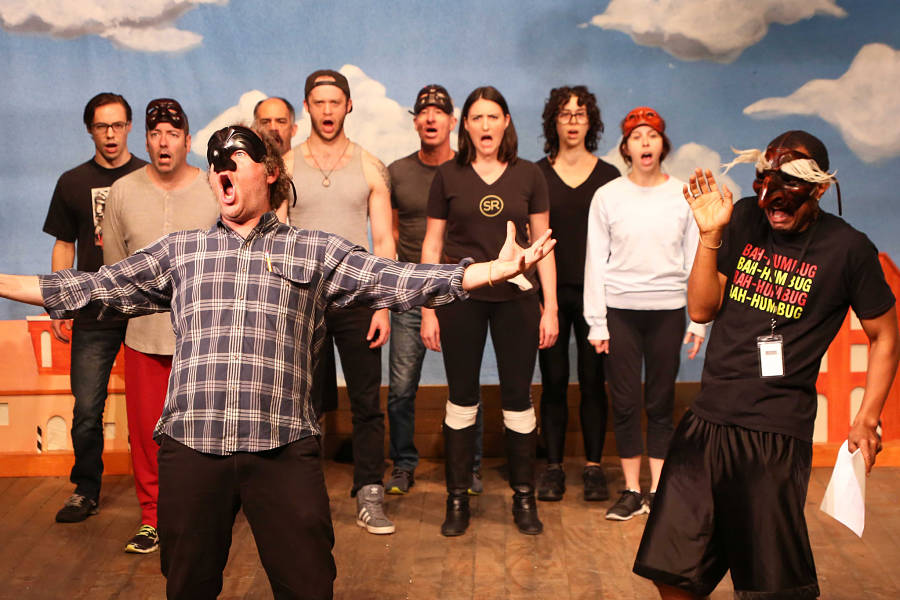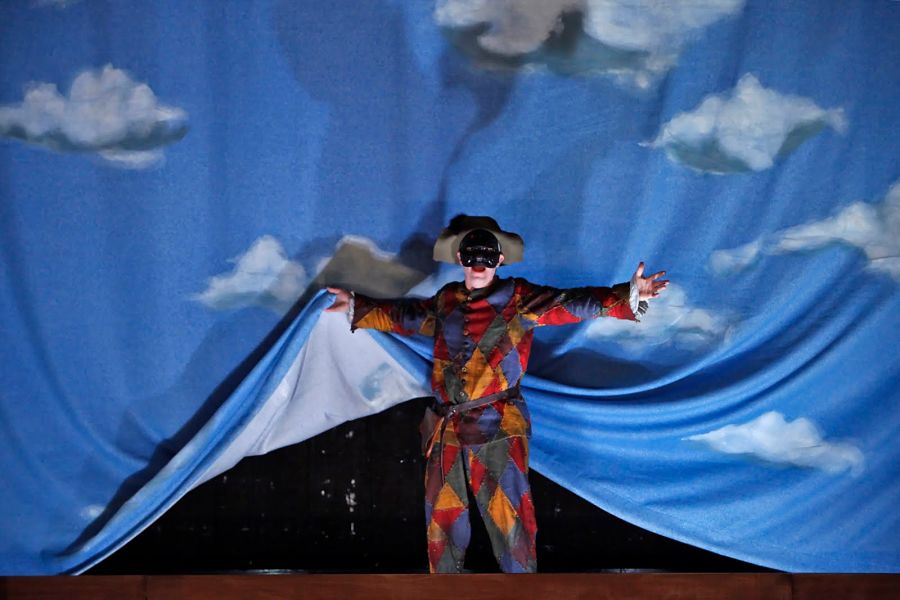The Theatre de la Jeune Lune, the renowned Minneapolis company that emphasized physical theatre, has been gone for nearly a decade, but its essence lives on in two of its still-kicking masters, Christopher Bayes and Steven Epp. The men, who met at de la Jeune Lune in the 1980s, are now bringing their acclaimed production of Carlo Goldoni’s commedia dell’arte masterpiece, The Servant of Two Masters, to Theatre for a New Audience‘s Polonsky Shakespeare Center in Brooklyn, Nov. 6-Dec. 4.
Bayes spent five years acting, directing, and designing at Jeune Lune and has since become an acclaimed director and teacher; he is currently professor and head of Physical Acting at the Yale School of Drama. Epp stayed with Jeune Lune and eventually became its co-artistic director, a role he now serves at the Moving Company, also in Minneapolis.
Epp and Bayes have more recently teamed up on Molière’s Doctor in Spite of Himself and Dario Fo‘s Accidental Death of an Anarchist. Their unique adaptation of Two Servants, though, began its life at Yale Repertory Theatre in 2010, then played an award-winning run at the Shakespeare Theatre in Washington, D.C, as well as at the Guthrie Theater in Minneapolis, ArtsEmerson in Boston, and Seattle Repertory Theatre. I spoke to them recently about their work, about the shifting boundaries of taste, and about the first time they put on the commedia masks.
STUART MILLER: Your show is filled with modern references to politics and pop culture, and the actors improvise a bit of the show every night. How do you maintain the balance between those modern touches and the commedia?
STEVEN EPP: The physical vocabulary is commedia at its heart.
CHRISTOPHER BAYES: Our production is deeply traditional in its own way. In terms of the design—we don’t set it in Coney Island or anything. Also what’s traditional for us is that we are not approaching this as an archeological dig but as a continuation of the legacy by bringing it right up to the present moment, as it should be.
How has the show changed from one production to the next?
BAYES: It’s different every time because the times are different. A year after Yale we did it in D.C., and there were different things going on. Also, the cast changes. It’s an extended company of people who have studied with me or with Steven that we’ve come to call the Lopsided Caravan of Misfit Toys. Some have been with the show since the beginning, some have been in other shows we’ve done, or in one part originally and now have aged up to a different part. So there’s always a freshness to it.

EPP: You really feel the gender and sexual politics have shifted since 2013, and since September, actually. You really feel what’s appropriate and what isn’t and what buttons are you pushing. There’s a huge inappropriateness to the bawdy side of comedy, so you wonder how you acknowledge that and still have all the fun.
BAYES: Commedia at its core is really bawdy and about appetite: What are you interested in, what do you pretend you are not interested in, what’s your secret?
How do you figure out what modern references do and don’t fit the show?
EPP: We have so much fun in rehearsal; we say every naughty thing we can think of.
BAYES: We say things in rehearsal we know are not going to make it into the play.
EPP: We just pack the show with stuff, knowing that in previews it will get cut. But it’s a way of working that muscle and having that much fun in the room. That sifting also means the one where you said, “I thought that would fall by the wayside,” stays because you realize it actually works. You don’t always know.
BAYES: And something that played in D.C. really well may not play well in Seattle, or you may say, “Well, that’s never going to play in Berkeley because they’re so liberal they’re conservative and they’re not going to laugh at any of that stuff.” With all the bad taste we bring into the room it demands that we have really good taste about it.
How does your collaboration work?
BAYES: We debate but we don’t fight. Steven will come over my shoulder and tell me things: “It’s on a three, now make it a seven.” He’s amazing about structure. I’m not so smart about structure. He says, “If this goes here and that goes there, then this part will come right through.” And I say, “Okay.” We are a part of the other’s brain that gets left behind a little bit.
EPP: He’s watching. He’s done it forever and is an actor and has taught, so he has that perspective. And when you are onstage with the other actors I lose a certain perspective but I also gain something.
BAYES: He’s looking at the audience and I’m looking at the cast.
EPP: And we’re looking at him looking at us. Chris, you’ve been an actor and a teacher. How does that influence your directing?
BAYES: Actually, when I was young I did a lot of magic, and I think part of my brain still works like that, in terms of how the mechanism and structure of magic works—how can we make something really sparkle and really surprising? But I think I direct with the heart of an actor: That moment doesn’t work on this impulse, will it work on that one? Will it feel more true and more honest?
I also have a sense of how far it can go, how elastic the comic world is, and how you can push it toward something tragic or very melodramatic if it stays true and feels grounded to something.
EPP: He is brilliant at being able to assess what a given actor is capable of and pulling out their best features, as opposed to saying, “We’re replacing this actor and the new one has to do what the other person did.” With Chris, it’s, “What do you bring and how do I help you get there?”

Do you remember your first time acting with a commedia mask?
BAYES: We’re elderly now, so it’s hard to recall.
EPP: At Theatre de la Jeune Lune, the first thing I ever did was a commedia workshop, and I hadn’t played in those traditional half-masks before. In workshops, you fail and fail, which is part of the process; it’s humiliating and devastating. Then I had one success, where you were given a problem and you get up with a mask and you improvise. I remember the first time it clicked and stuff started to happen and you could keep going. As an actor, finding that first step is amazing. Then you lose it the next time you get up there. That never fucking stops for the rest of your life.
We also did clown workshops. I failed miserably at clowns. I understood commedia at least. The clown is more naturally open and naïve, and is able to accept their soft brain and celebrate that. In commedia you can’t be in your head, but it’s a little more intellectual in a certain way. That’s where my tendency goes.
BAYES: You have a physical knowledge of how it works in commedia, mathematially and musically. I don’t have that muscle as much; I didn’t then. I’m kind of the opposite. There’s something about the clowns I understood.
One of first things I always tell my students, whether it’s in clown or commedia, is that there’s no reason you should be able to do this already. You’re going to learn as much from not getting it as from getting it. The silence is as important as the laughter, and if you own both of those you’ll never be bad because you become elastic inside of there. Go all the way into your disaster and then you can start to bring the mask to life, because it’s not so attached to your ego or your need for success and solutions.
How would you define the difference between clowns and commedia?
BAYES: They’re cousins. Clown is very innocent and naïve and comes from a more poetic world. They don’t know anything. If the clowns ever grew up and became sexualized and began having appetites for money, sex, love—then it’s commedia. I always start students with the clown.
EPP: You can have clown shows and groups of clowns, but they tend to function a little more solo, whereas commedia is very social and part of the community.
BAYES: Commedia is also full of status.
EPP: And politics.
Do people come expecting clown and get commedia?
BAYES: I don’t think general public separates them the way we do. But it does put pressure on us. There’s not a lot of funny commedia out there.
EPP: It does take people a while to adjust to the masks and to the whole theatrical vocabulary. There’s a learning curve there. It’s like Shakespeare.
BAYES: I never understand the first half hour of any Shakespeare play. But this starts like a train. It’s so theatrical. This is why you go to the theatre; when you come to a show you don’t want to see TV. They get on board. For me this piece is a celebration of the theatre. Comedy is a conversation with the audience.
What impact does the improvising have on the performances?
BAYES: Everybody is just a little bit more alive on the stage because something might happen—as opposed to, “Blah blah blah,” and then I walk over here. That’s where you find the death of the theatre, and it always happens over a long run. So I give these guys license to rediscover the piece nightly.
Is that scary?
EPP: Totally. That little edge of fear and potential failure is so important—that’s what keeps you alive. That’s what was at the heart of commedia. That we’re always changing it up keeps you on your toes—you want to have a few anchors, but then there are all these places you can slip in something you haven’t done before. Once you get comfortable then you can fuck with each other during the show.
BAYES: The audience loves that. They want to see the car crash.
Stuart Miller is a freelance journalist based in New York City.


